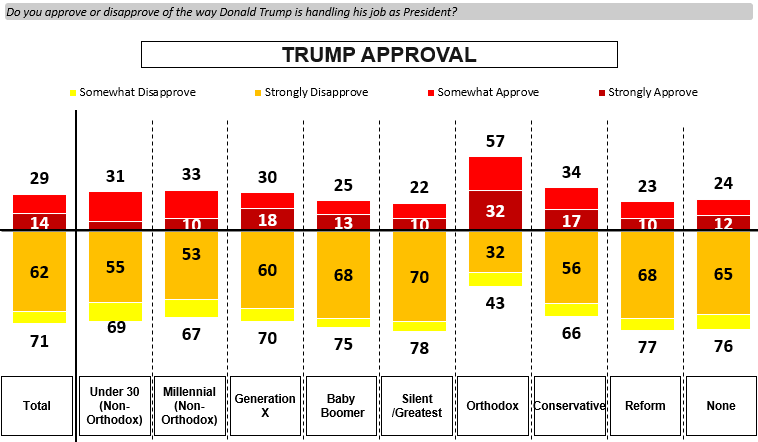Reason: Are Young American Jews as Left-leaning as the Media Suggests?
By David Bernstein
If one reads both the secular and Jewish American media, one gets the impression that a virtual revolution is going on among the younger generation of American Jews. Focusing on various leftist and left-leaning Jewish groups, such as JStreet U, IfNotNow, Open Hillel, and Never Again Action, I’ve read dozens of articles suggesting that young Jews are overwhelmingly extremely progressive, hostile to the mainstream Jewish establishment for being too “conservative” (event though that establishment is overwhelmingly liberal on the standard American political spectrum), and in a state of rebellion against what they perceive to be the Jewish establishment’s failure to adequately “resist” Donald Trump and to challenge “the occupation” in Israel.
This narrative makes some intuitive sense. After all, young Americans in general are more left-leaning than older Americans, and there the omnipresent left-leaning young Jewish cohort would logically be much bigger now than it was in more conservative eras. Top that off with the fact that the Reform movement has come to dominate American non-Orthodox Jewish religious life, and that this movement has increasingly blurred the lines between normative Judaism and left-wing politics.
And yet, a recent survey by the Democratic GQR polling firm , commissioned by the Jewish Electorate Institute, tells a different story. Here is the key chart:

Note that millennials and under-30s approve of Donald Trump at higher rates than older Jews. And that’s not all. The chart mysteriously excludes Orthodox Jews from its data on Trump approval by age group, but only from the younger cohorts. Thanks to high Orthodox birth rates, Orthodox outreach efforts, and widespread assimilation among the non-Orthodox, Orthodox Jews are a much larger percentage of the younger Jewish cohort than of older Jewish cohorts. Orthodox Jews are approximately 10% of all American Jews, but 25% of those under 18. 20% seems a reasonable estimate of the percentage of American Jews 18-30 who are Orthodox. And 57% of Orthodox Jews approve of Trump, but let’s round that up to 60% for the younger cohort, since younger Jews in general are more approving of Trump. That means that while only 22% of “greatest generation” Jews approve of Trump, approximately 37% of American Jews under 30 approve of Trump. By contrast, a recent poll showed that only 33% of Americans ages 15-34 approve of Trump.
If true, this would be especially remarkable because young American Jews tend to not be “religious” and live in coastal urban areas, two demographic indicators that strongly predict hostility to Trump.
Of course, the JEI poll needs to be confirmed by other data. And it’s entirely possible that it’s both true that young Jews are more conservative/Republican/supportive of Trump, and that those who aren’t are more leftist than prior generations. But various groups are pushing a narrative that the American Jewish establishment needs to become even more “progressive” if it doesn’t want to lose the attention of young American Jews. In turns out that, if anything, the opposite might be true.




